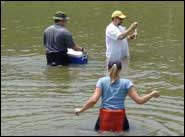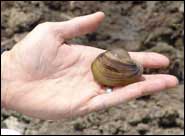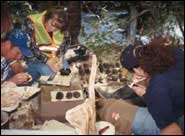















Successes in Stewardship: September 2005 |
|---|

|
Federal Highway Administration
September 2005
Protecting Mussels: Innovative Practices in Endangered Species Stewardship


When most people think of endangered species, probably, mussels aren't what first thought that springs to mind. However, not only are freshwater mussel species among the most endangered group of species in the country *, they are also critical to maintaining healthy aquatic ecosystems. Mussels are a food source and act as a natural filtration system as they feed on algae, plankton, and silts. New collaborations across the country are protecting mussels through streamlining compliance with Section 7 of the Endangered Species Act (ESA).
The ESA mandates two requirements for Federally funded transportation projects. The first is to guarantee that development will not jeopardize the existence of threatened and endangered (T&E) species, or result in adverse modifications of critical habitat. The second is to consult with the U.S. Fish and Wildlife Service (FWS) and employ their assistance to avoid jeopardizing a listed species. State Departments of Transportation (DOTs) have adopted a number of noteworthy practices to improve Section 7 implementation and to enhance their working relationships with FWS and State wildlife agencies.
*According to the Nature Conservancy, about 70 percent of freshwater mussels in the United States are at risk, compared to less than 20 percent of mammalian species and about 15 percent of bird species.
Several State Dots are implementing innovative efforts that employ tools and techniques including training, agreements, relocation, field guides, research, and protocols
Arkansas's Mussel Relocation
Arkansas State Highway and Transportation Department (AHTD) and Arkansas State University (ASU) with support from the Federal Highway Administration (FHWA) Streamlining Funding is working with FWS, Arkansas Ecological Services Field Office, Arkansas Game and Fish Commission, and U.S. Army Corps of Engineers (USACE) on an unprecedented effort to monitor the relocation of Potamilus capax (Fat Pocketbook mussels). Individual mussels have been "tagged" and a sophisticated system has been employed to quickly find the individual organisms for periodic health assessments using minimally invasive tissue sampling. The research includes a Habitat Restoration Plan (HRP) in the Tyronza River utilizing techniques learned from this relocation work. The HRP will then be submitted to FWS for formal consultation. Consultation will lay the groundwork for a programmatic biological opinion to provide a protocol for future highway projects that may impact the P. capax. AHTD anticipates the protocol will streamline the existing process from 210 days to 30 days.
Georgia's Mussel Survey Protocol, Mussel Habitat Restoration, and Pocket Field Guide
To streamline compliance with Section 7 of ESA, the Georgia DOT (GDOT) developed a standard mussel survey protocol with FWS that enables GDOT to conduct field studies to determine a proposed action's potential to affect Federally-listed mussels. Under this protocol, certified consultants use trained divers for initial surveys to assess the presence/absence of mussels. FHWA, GDOT and FWS use the findings to complete consultation at the informal level if no listed mussels or suitable habitat are found. GDOT is also sponsoring a research project on the restoration of mussel habitat through the improved bridge design and use of permeable materials to address bridge scour and stream habitat degradation. Additionally, the FHWA Georgia Division Office, in partnership with FWS, The Nature Conservancy, Columbus State University, and Georgia Power Corporation, are developing a pocket field guide and poster to aid in field identification of indigenous mussel species for the Apalachicola, Chattahoochee River, and Flint Basin in Georgia-three river systems that will eventually cover the entire state. Future plans include expanding the guide to cover each basin in Georgia. The survey protocol and pocket field guide will be used as a training guide for ecologists. The identification of mussels and habitat early in project development will help to streamline the environmental review process for over 200 bridge projects per year and bridge maintenance projects statewide.
Louisiana Relocation Success
In an effort to minimize impact on Margartifera hembeli (Louisiana Pearlshell mussel) at a bridge replacement project, Louisiana Department of Transportation and Development (LADOTD) helped to relocate affected mussels. The relocation was a collective effort between LADOTD, FWS, the Louisiana Natural Heritage Program, and Louisiana State University. During construction, double silt fences were placed around the bridge area to insure that the project did not significantly change the turbidity of the creek. Large rocks were positioned beneath the bridge to stabilize the soil. Following the relocation a four-year monitoring of mussel growth and water quality was conducted by LADOTD. Eighty-seven percent of the moved mussels were found healthy and alive; the remaining mussels very likely may have moved out of the relocation area. Researchers discovered an overall increase in M. hembeli mussels found near the bridge. LADOTD, with its partners, was able to utilize sound scientific methods and actually improve the mussel habitat at the bridge site.
|
Formal Consultation Guidance
More specific guidance related to Section 7 of ESA and consultation procedures can be found on the following websites: FHWA Wildlife Useful Practices
Learn about FHWA's program Keeping it Simple: Easy Ways to Help Wildlife Along Roads. This program includes a database with low-cost and practical wildlife solutions, including mussel related practices.  LADOTD, FWS, the Louisiana Natural Heritage Program, and Louisiana State University preparing mussel shells for bee tags and eventual relocation. |
Missouri Mussel Relocation Study
After learning that the US Highway Route 61 bridge replacement over the Meramec River would impact a mussel bed that contained Lamsilis abrupta (Pink Mucket mussel), a Federally endangered fresh water mussel, MoDOT entered into informal consultation with FWS. During the consultation, MoDOT and FWS identified implementation measures to eliminate the project's impact to the mussels. The measures included: relocation of the affected species, habitat creation, and development and execution of a monitoring plan. MoDOT relocated all species (listed and non-listed) to a previously identified habitat. Over a period of two years, the L. abrupta species were assessed for stress and the habitat restoration site was monitored. Because of the extensive informal consultation and relocation efforts, FWS decided that formal consultation was unnecessary. FWS also concurred with MoDOT's biological assessment determination that the project was "Not likely to adversely affect" the Federally endangered pink mucket. The success at the Meramec River site has saved project time and money and will assist in future streamlining through early interagency coordination.
North Carolina's Mussel Pre-Survey Screening
Mussel Pre-Survey Screening Permits are required nationwide to survey for Federally-listed freshwater mussels as part of ESA compliance. In North Carolina, there is a shortage of individuals who possess permits to conduct mussel surveys. This has led to project delays. The North Carolina DOT (NCDOT) has implemented a "screening" process in conjunction with the U.S. Forest Service (USFS) and North Carolina Wildlife Resources Commission (NCWRC) to assess if any mussels are present at a location. If no mussels are found, no full survey is preformed. The screening process has reduced the number of full surveys that normally would have been performed, resulting in a faster and less costly ESA compliance process with better utilization of resources. Results from 2004 reveal that out of 73 screenings, 55 screenings (75 percent) did not require full surveys.
West Virginia's Department of Highways Survey of State Listed Mussel Species
West Virginia's Department of Highways (WVDOH) has an agreement with West Virginia Department of Natural Resources (WVDNR) to train WVDOH to perform mussel surveys. WVDOH sends staff to a two-week intensive training and certification course to learn how to locate and identify state protected mussel species. Curriculum was created by a local university and WVDNR, and involves equal time in the classroom time and in the field . The agreement with WVDNR has enabled WVDOH to survey state riparian areas more comprehensively than has been achieved in the past. The preliminary project work, that used to be delayed due to the limited number of qualified ecologists, can now be expedited. WVDOH's ability to perform surveys on state listed mussel species also results in identifying new locations for state species and possible suitable habitat for Federally-listed mussels.
Beyond protecting mussel species, the featured State DOTs and FHWA have improved communication with FWS and State wildlife agencies. They have built working relationships, particularly through research projects, that can facilitate the discovery of new techniques and the streamlining of ESA compliance for other species, and lead to a reduced need for formal consultations with FWS. To learn more about how their innovative practices were established, you can contact agency representatives directly. Contact information is provided below.
|
Katy Allen, PE Environmental Specialist FHWA - Georgia Division 61 Forsyth St., Suite 17T100 Atlanta, GA 30303 (404) 562-3653 Katy.Allen@fhwa.dot.gov |
Norse Angus Transportation Analyst Manager WVDOH 1900 Kanawha Blvd., Building 5 East Charleston, WV 25305-0430 (304) 558-9664 Nangus@dot.state.wv.us |
Rob Ayers, AICP Environmental Programs Coordinator FHWA - North Carolina Division 310 New Bern Ave., Suite 410 Raleigh, NC 27301 (919) 856-4353 Rob.Ayers@fhwa.dot.gov |
|---|---|---|
|
Michele Deshotels Environmental Impact Manager 2 LADOTD P.O. Box 94245 Baton Rouge, LA 70804-9245 (225) 242-4506 MicheleDeshotels@dotd.louisiana.gov |
John Harris, PhD Section Head - Special Studies Environmental Section AHTD P.O. Box 2261 Little Rock, AR 72203 (501) 569-2522 John.Harris@arkansashighways.com |
Alan Leary Senior Biological Specialist MoDOT 105 West Capitol Ave. Jefferson City, MO 65102 (513) 526-6678 Alan.Leary@modot.mo.gov |
|
Look What's New!
|
|
